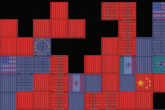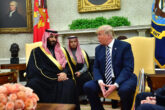May 01, 2020
Global Supply Chains, Economic Decoupling, and U.S.-China Relations, Part 2: The View from the People’s Republic of China
Introduction: The World As Beijing Sees It
U.S. economic policy is not the only force at play threatening to disrupt the deep economic ties between the People’s Republic of China (PRC) and the United States (as discussed in part 1 of this article series). Chinese officials have also been driving a wedge. From the launch of the National and Medium- and Long-Term Program for Science and Technology Development (PRC State Council, 2005) to Made in China 2025 (PRC State Council, 2017), China has consistently pushed for self-sufficiency in specific sectors, limiting foreign exposure where possible . As the Trump Administration has adopted a more confrontational trade posture with China, introducing trade and investment restrictions, Beijing’s plans have only been accelerated.
However, the additional forces driving apart the world’s two largest economies are secular economic trends. The PRC faces a shrinking, shifting workforce that threatens to undercut its global manufacturing status, and a looming middle-income trap that encourages Beijing to compete with Washington in high-value-add sectors. Looking forward, the economic shock from the COVID-19 pandemic will likely make the United States and the PRC further averse to interdependence, if the pandemic has a lasting impact into the future.
Read the full article in The Jamestown Foundation's China Brief.
More from CNAS
-
Game Over?
The trade wargame suggests that sustained high tariffs could create leverage and urgency to spur action toward a productive restructuring of the international trade system....
By Emily Kilcrease & Geoffrey Gertz
-
Middle East Security / Energy, Economics & Security
Trump Inks $600 Bn Deal In Saudi Arabia | Musk, Blackrock CEO Flank Trump In Gulf VisitIn today's episode of India Global, U.S. President Donald Trump secured a $600 billion commitment from Saudi Arabia on Tuesday to invest in the United States. NDTV's Gaurie Dw...
By Daniel Silverberg
-
Energy, Economics & Security / Technology & National Security
Tariffs and Tech: An Uncertain RecipeHigher tariffs could prompt American cloud companies to shift more of their capital investments abroad....
By Pablo Chavez
-
Trump Tariffs: How Will U.S. Plans Reshape the Global Economy?
Donald Trump says he's already decided the tariffs he will impose on countries that export goods to America, including the United Kingdom. Channel 4 hears from Emily Kilcrease...
By Emily Kilcrease




